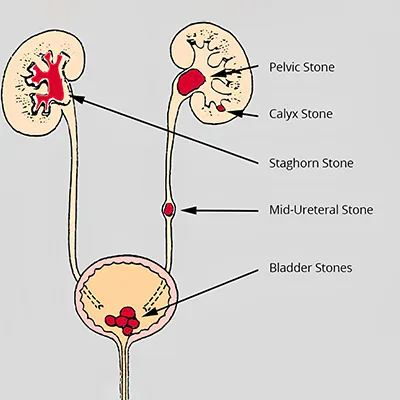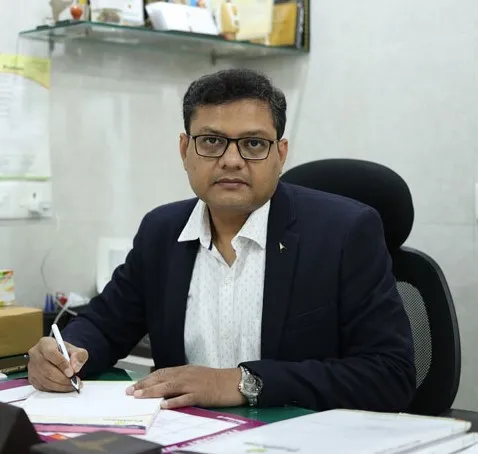
Kidney Stones/Urinary Stones Treatment in Ahmedabad
Urinary stones, also known as urolithiasis or kidney stones, are hard mineral and salt deposits that form in the urinary tract. These stones can develop in the kidneys, ureters, bladder, or urethra, and can vary in size and composition. Urinary stones can cause significant pain and discomfort and may lead to complications if not treated properly. Early detection and effective management are crucial to prevent recurrence and ensure proper urinary function.
The treatment of urinary stones depends on the size, location, and composition of the stones, as well as the severity of symptoms. Treatment options include :
- Medical Therapy : For small stones, medications such as alpha-blockers may be prescribed to relax the muscles of the ureter and help pass the stones more easily. Pain relief medications and anti-nausea drugs may also be used to manage symptoms.
- Extracorporeal Shock Wave Lithotripsy (ESWL) : ESWL is a non-invasive procedure that uses shock waves to break up stones into smaller pieces that can be passed more easily through the urine.
- Ureteroscopy : A minimally invasive procedure where a thin, flexible scope is inserted through the urethra and bladder into the ureter to locate and remove or break up stones.
- Percutaneous Nephrolithotomy (PCNL) : For larger or more complex stones, PCNL involves making a small incision in the back to access and remove the stones directly from the kidney.
- Surgical Removal : In rare cases where other treatments are ineffective or the stones are too large, open surgery may be required to remove the stones.
- Preventive Measures : After treatment, preventive strategies such as increased hydration, dietary modifications, and medications may be recommended to reduce the risk of stone recurrence. Regular follow-up and imaging may also be necessary to monitor for any new stone formation.
Understanding urinary stones and the available treatment options is vital for managing the condition and preventing recurrence. With the right approach, most patients can achieve symptom relief, avoid complications, and maintain a healthy urinary system.
Common Indications for Urinary Stones
Why This Procedure is Important?
Urinary stones can cause intense pain and discomfort, particularly if they obstruct the flow of urine. Left untreated, they can lead to complications such as infections, kidney damage, or the need for emergency surgery. Proper management of urinary stones is essential to relieve symptoms, prevent complications, and reduce the risk of recurrence. Understanding the importance of lifestyle modifications, hydration, and medical intervention can help individuals manage and prevent urinary stones effectively.
Best Specialist for Kidney Stones/Urinary Stones Treatment in Ahmedabad
Dr. Kalpesh Kapadia
MCh(GenitoUrinary Surgery-Urology)
GoldMedalist
FMAS
Dr. Kalpesh Kapadia, with over 15 years of experience, is a highly skilled urologist specializing in a comprehensive range of urological disciplines, including andrology, laparoscopic and robotic urology surgeries, female and pediatric urology, uro-oncology, reconstructive urology, and neuro-urology.
Holding an M.Ch in Genito-Urinary Surgery from B.J. Medical College, Ahmedabad, Dr. Kapadia has a distinguished academic background and extensive expertise in managing prostate cancer and other complex urological conditions. His advanced proficiency in minimally invasive techniques, including laparoscopic and robotic surgeries, ensures precise tumor removal, effective treatment, and optimal recovery.
Committed to delivering exceptional patient-centered care, Dr. Kapadia is the ideal choice for those seeking expert urological treatment with a focus on achieving the best possible outcomes and enhancing overall well-being.
Need Best Urology Hospital Near You?
24 x 7 Emergency Service
and effective treatments. This enables us to provide you with the highest standard of care.


